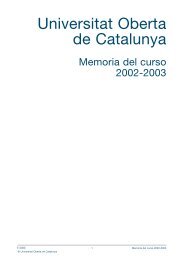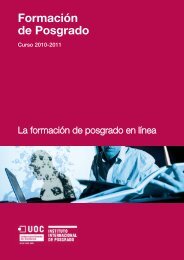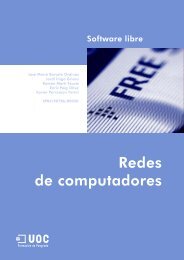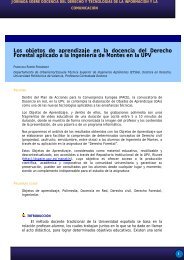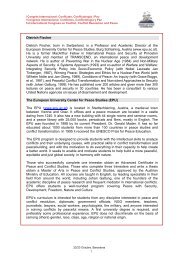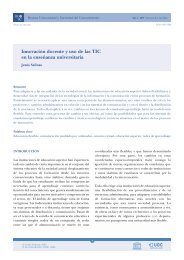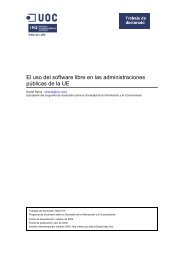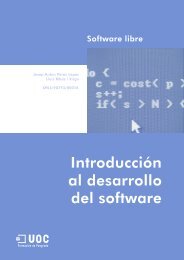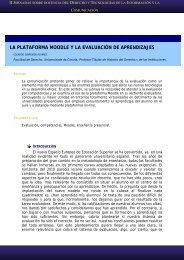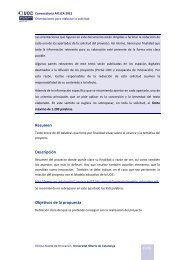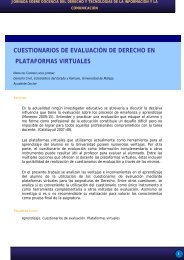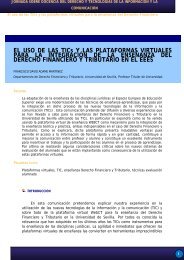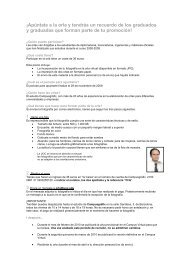e-governance and citizen information - Universitat Oberta de ...
e-governance and citizen information - Universitat Oberta de ...
e-governance and citizen information - Universitat Oberta de ...
You also want an ePaper? Increase the reach of your titles
YUMPU automatically turns print PDFs into web optimized ePapers that Google loves.
E-<strong>governance</strong> <strong>and</strong> Citizen Information 106 Managing Technological Innovationsector than from the Telecommunications <strong>and</strong> Information Technology Centre. Telecommunications<strong>and</strong> Information Technology Centre. In other words many <strong>de</strong>partments began totake over the management of their own systems” (P9). “In any case, everything comes downto fashions in the market, from 1995 to 2000 the fashion was for outsourcing <strong>and</strong> now it'sgoing in the opposite direction. Each provi<strong>de</strong>r has its strong points <strong>and</strong> one has to take advantageof them. These days, IT is a tool for business transformation” (P24).However, the benefits of outsourcing were not clear: “The structure of T-Systems en<strong>de</strong>d upwith invoicing by hours to different profiles that was atrocious [...] Now T-Systems brings corporatesupport (mail, etc), <strong>and</strong> something of <strong>de</strong>velopment. There's a certain immobility whilstwaiting to see what happens” (P9). For this reason, in the end, it involved a rethinking of themo<strong>de</strong>l: “the relationship with the private sector? Before it was a relationship of conveniencewith no planning. Now there is a long-term planned relationship. It is strengthening the productionof contents. A basis of internal production has been ab<strong>and</strong>oned. On the other h<strong>and</strong>,now the Administration is more involved in <strong>de</strong>cision-making <strong>de</strong>spite the fact that the volumeof outsourcing has increased” (P28). From the private sector there is recognition of thischange: “It has become total control – there wasn't any before – it's very exhaustive, fromthe tools to the whole process. This control is good for comparing i<strong>de</strong>as, <strong>de</strong>spite the fact thata lot of time is taken up on useless reports <strong>and</strong> explanations that go nowhere...” (P33).6.4.2. The Know HowAn element strongly linked to outsourcing was the loss of knowledge within the Administration:“in reality T-Systems did more of those things than they said. There was a certain cautionabout this: some <strong>de</strong>velopment was requested. Once they had done something, it'spossible that the same thing was requested again <strong>and</strong> they replicated it for another unit or<strong>de</strong>partment. [...] The problem in this sense was the ownership of knowledge <strong>and</strong> a certaincarelessness on the part of the Generalitat regarding how to take care of it” (P63).Now there is a better un<strong>de</strong>rst<strong>and</strong>ing about what has to be done. In the words of one civilservant: If you know what you want to do, you can't outsource the brain only the ‘h<strong>and</strong>s’ (P2).“It's also important that this knowledge is, <strong>and</strong> remains, within the Administration. The situationhas also changed because earlier the companies were the ones who knew how to dosomething, whereas now there is wi<strong>de</strong>spread uncertainty” (P7).http://www.uoc.edu/in3/pic




